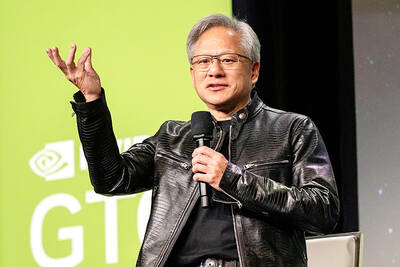Taiwan Semiconductor Manufacturing Co (TSMC, 台積電) halted shipments to a customer this month after its semiconductors were sent to China’s Huawei Technologies Co (華為), potentially breaching US sanctions, a government official said.
The US slapped sanctions on Huawei in 2019, and expanded them the following year, over fears its technology could be used for Beijing’s espionage operations. The restrictions prevent TSMC from selling semiconductors to Huawei.
However, TSMC discovered on Oct. 11 that chips made for a “specific customer” had ended up with the Chinese company, a Taiwanese official with knowledge of the incident said on the condition of anonymity.

Photo: Bloomberg
TSMC “immediately activated its export control procedures,” halting shipments to the customer and “proactively” notifying US and Taiwanese authorities, the official said.
In a statement on Wednesday, TSMC said it was a "law-abiding company" and had not supplied Huawei since mid-September 2020 in compliance with export controls.
"We proactively communicated with the US Commerce Department regarding the matter in the report," TSMC said, apparently referring to media reporting of the incident.
"We are not aware of TSMC being the subject of any investigation at this time."
The Ministry of Economic Affairs yesterday said that TSMC had informed it about the incident, but had not identified the client.
“There was already an interaction and a contractual partnership in place, so it’s an old client,” the ministry said.
The ministry added that the entity had been a client of TSMC since before the 2020 deadline for companies to comply with the export controls, and that “no shipments have been made since October 11.”
Bloomberg reported on Tuesday that Canadian research firm TechInsights had found an advanced processor made by TSMC inside Huawei's latest AI chip.
The company told Bloomberg that it hadn't "produced any chips via TSMC after the implementation of the amendments made by the US Department of Commerce" to its trade restrictions targeting Huawei in 2020.
The incident highlighted the lack of visibility into China’s domestic chip industry, said Chiang Min-yen (江旻諺), a non-resident fellow at the Research Institute for Democracy, Society, and Emerging Technology.
“External parties lack sufficient information to understand which companies are actually under Huawei’s influence,” Chiang said.

‘DECENT RESULTS’: The company said it is confident thanks to an improving world economy and uptakes in new wireless and AI technologies, despite US uncertainty Pegatron Corp (和碩) yesterday said it plans to build a new server manufacturing factory in the US this year to address US President Donald Trump’s new tariff policy. That would be the second server production base for Pegatron in addition to the existing facilities in Taoyuan, the iPhone assembler said. Servers are one of the new businesses Pegatron has explored in recent years to develop a more balanced product lineup. “We aim to provide our services from a location in the vicinity of our customers,” Pegatron president and chief executive officer Gary Cheng (鄭光治) told an online earnings conference yesterday. “We

It was late morning and steam was rising from water tanks atop the colorful, but opaque-windowed, “soapland” sex parlors in a historic Tokyo red-light district. Walking through the narrow streets, camera in hand, was Beniko — a former sex worker who is trying to capture the spirit of the area once known as Yoshiwara through photography. “People often talk about this neighborhood having a ‘bad history,’” said Beniko, who goes by her nickname. “But the truth is that through the years people have lived here, made a life here, sometimes struggled to survive. I want to share that reality.” In its mid-17th to

LEAK SOURCE? There would be concern over the possibility of tech leaks if TSMC were to form a joint venture to operate Intel’s factories, an analyst said Taiwan Semiconductor Manufacturing Co (TSMC, 台積電) yesterday stayed mum after a report said that the chipmaker has pitched chip designers Nvidia Corp, Advanced Micro Devices Inc and Broadcom Inc about taking a stake in a joint venture to operate Intel Corp’s factories. Industry sources told the Central News Agency (CNA) that the possibility of TSMC proposing to operate Intel’s wafer fabs is low, as the Taiwanese chipmaker has always focused on its core business. There is also concern over possible technology leaks if TSMC were to form a joint venture to operate Intel’s factories, Concord Securities Co (康和證券) analyst Kerry Huang (黃志祺)

‘MAKE OR BREAK’: Nvidia shares remain down more than 9 percent, but investors are hoping CEO Jensen Huang’s speech can stave off fears that the sales boom is peaking Shares in Nvidia Corp’s Taiwanese suppliers mostly closed higher yesterday on hopes that the US artificial intelligence (AI) chip designer would showcase next-generation technologies at its annual AI conference slated to open later in the day. The GPU Technology Conference (GTC) in California is to feature developers, engineers, researchers, inventors and information technology professionals, and would focus on AI, computer graphics, data science, machine learning and autonomous machines. The event comes at a make-or-break moment for the firm, as it heads into the next few quarters, with Nvidia CEO Jensen Huang’s (黃仁勳) keynote speech today seen as having the ability to